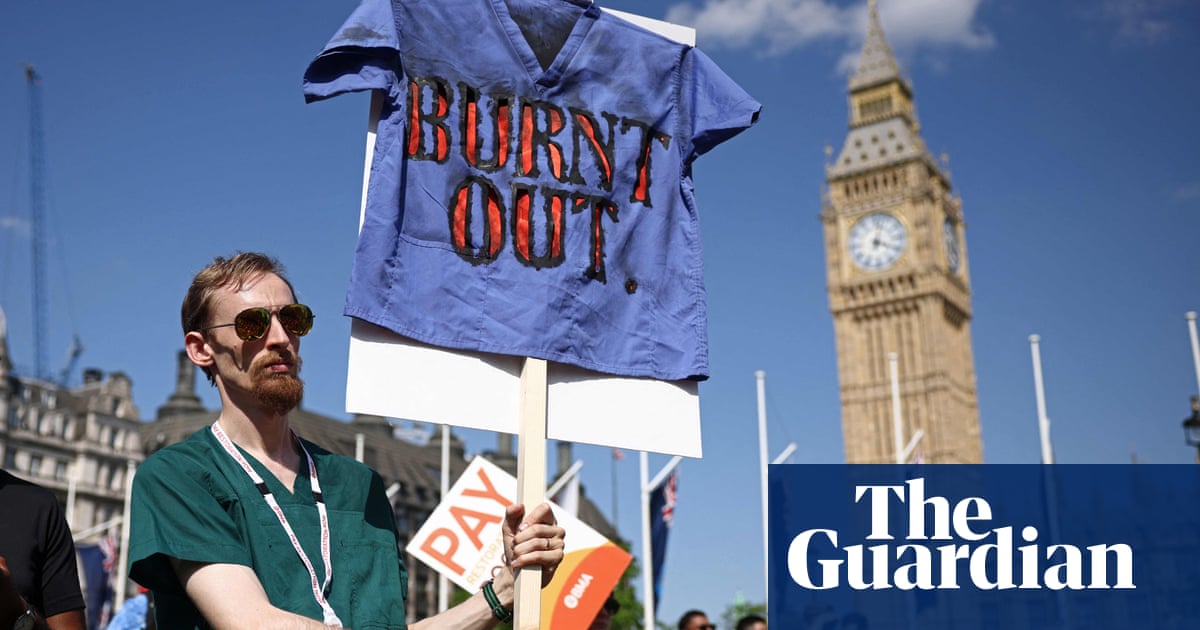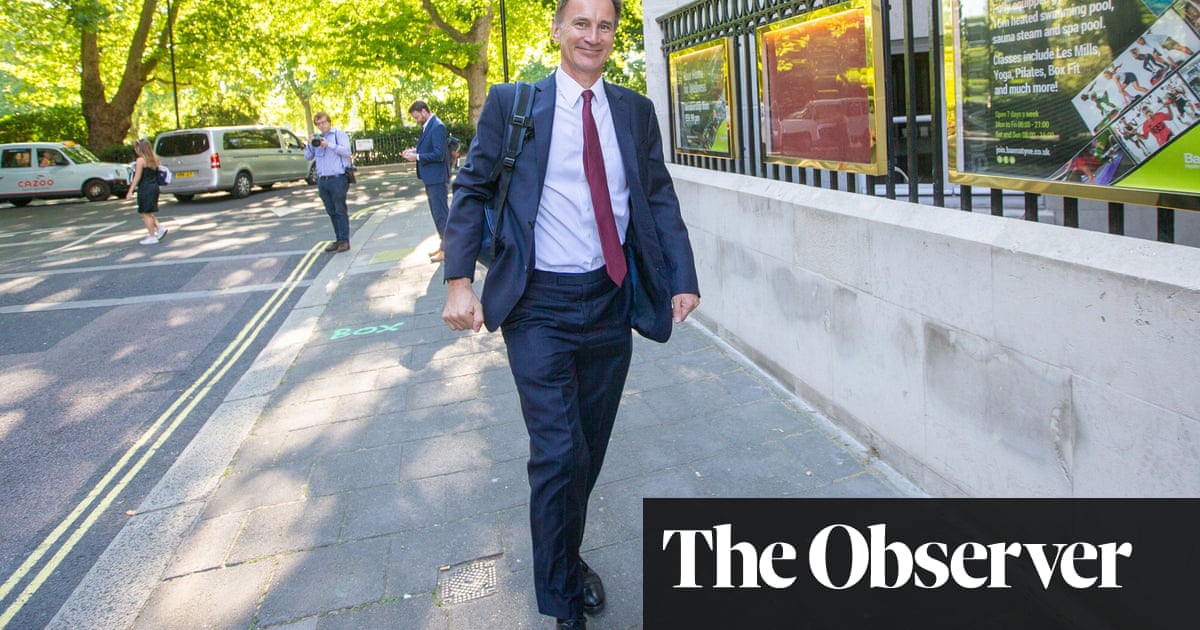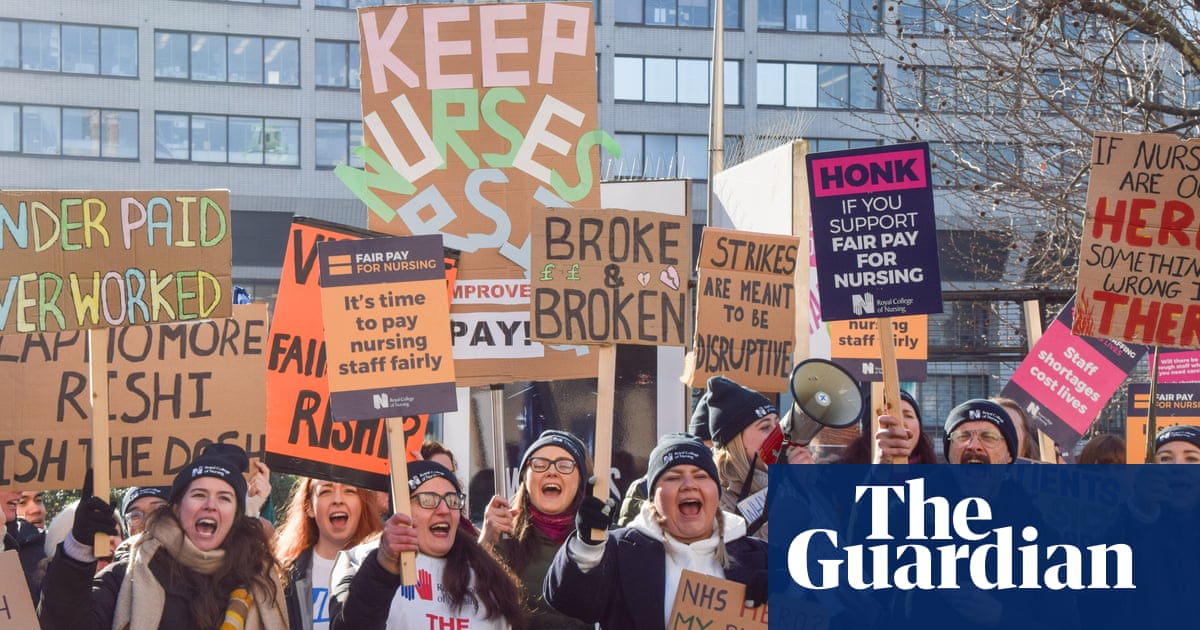
Ministers have offered more than 1 million NHS staff in England a 3% pay rise, three times higher than its initial 1% offer which sparked fury among frontline workers.
However, nurses are likely to reject the award as too low and may take industrial action in protest. Other health unions also plan to ballot their memberships over possible strike action.
Following a day of confusion and rising tensions, the government dropped plans to make only 1.5% of the 3% uplift a permanent increase to salaries, with the other 1.5% in effect a one-off bonus. It came after staff groups warned privately that they would condemn any deal structured that way.
However, the government’s decision to exclude the NHS’s 61,000 junior doctors – all medics below the level of consultant – from the pay award is certain to cause deep unease among a key group of staff who undertook a series of strikes in 2015-16 in protest at a proposed new contract.
The pay rise offer comes after the Covid pandemic left hospitals overwhelmed and forced staff to adapt to full personal protective equipment and the cancellation of leave. Waiting lists have risen to a record 5 million patients.
Ministers stressed on Wednesday that they had accepted in full the recommendations of the two independent pay review bodies which advise the government on levels of NHS pay. The Department for Health and Social Care (DHSC) said 3% was a “recognition of the unique impact of the pandemic on the NHS”.
The 3% is for the 2021-22 financial year that began on 1 April, so will be backdated to then, the DHSC added. It will cover most NHS staff including nurses, paramedics, consultant doctors, dentists and salaried GPs but not doctors and dentists who are still in training.
“NHS staff are rightly receiving a pay rise this year despite the wider public sector pay pause, in recognition of their extraordinary efforts,” said Sajid Javid, the health secretary.
The DHSC disclosed the offer just before 6pm, hours after pulling the announcement at the last minute from a ministerial statement to MPs by the health minister Helen Whately. It did not explain why.
Health unions criticised the 3% offer as “grossly inadequate” and “paltry” given frontline workers’ work in tackling the pandemic and the real-terms fall in income over the last decade, during which they received annual rises of just 1% or had their salaries frozen.
Organisations representing NHS trusts were more positive. Chris Hopson, chief executive of NHS Providers, welcomed the decision to ditch the 1% offer made earlier this year, which Boris Johnson had insisted showed ministers were giving NHS staff “as much as we can”.
But Hopson added: “It is disappointing to hear that the 3% rise has not been applied for all grades of staff, including junior doctors, as trust leaders emphasised the need for a fair deal to be applied across the whole workforce. Overall, this is a helpful improvement on the government’s initial 1% proposal, which understandably provoked widespread condemnation.”
“When the Treasury expected inflation to be 3.7%, ministers are knowingly cutting pay for an experienced nurse by over £200 in real terms,” said Pat Cullen, the acting general secretary of the Royal College of Nursing (RCN), which had argued for nurses to get a 12.5% rise.
Cullen warned that nurses in England could go on strike for the first time over the 3% offer. The RCN’s members in Scotland have already rejected a 4% offer from the Scottish government. “The profession will not take this lying down,” she said. “We will be consulting our members on what action they would like to take next.”
The RCN has set aside £35m to cover the costs of a potential strike and is training 25,000 members as workplace activists to help it ensure that at least half of members vote in any ballot, to comply with trade union laws brought in by the Conservatives.
Unite branded the pay offer “grossly inadequate and underwhelming, given the sacrifices health staff have made over the last 18 months combating coronavirus”. Rachel Harrison, a national officer with the GMB, said: “NHS workers know their worth and so do the public – shame on the government who don’t.” Both unions will consult their members to gauge the strength of feeling about the award.
Unions’ highly critical reaction raises the prospect of the government facing a period of significant discontent among NHS staff, especially nurses. Consultants, who were seeking a 5% increase, recently warned that they may refuse to do paid or unpaid overtime in protest.
Labour attacked ministers’ “shoddy, ill-thought through” proposal and described it as another example of a government U-turn. Justin Madders, the shadow health minister, said: “After their hypocrisy applauding NHS workers while trying to cut their pay, the government must make our NHS and key workers feel supported and valued after all they have done for us.”
The Labour-run Welsh government also said it was awarding a 3% pay rise to NHS workers.
Labour also took aim at what it said was a real-terms pay cut for police officers. Nick Thomas-Symonds, the shadow home secretary, said it was a blow to those who have “served the country so bravely throughout the pandemic”.












